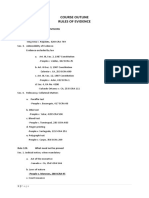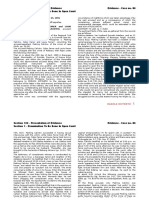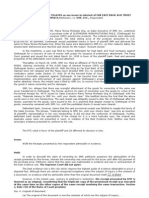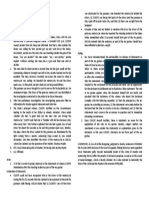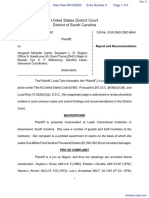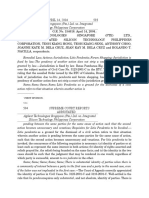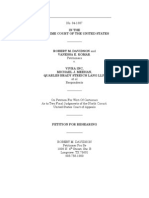G.R. No. L-31408 April 22, 1991
G.R. No. L-31408 April 22, 1991
Uploaded by
Kikoy IlaganCopyright:
Available Formats
G.R. No. L-31408 April 22, 1991
G.R. No. L-31408 April 22, 1991
Uploaded by
Kikoy IlaganOriginal Description:
Original Title
Copyright
Available Formats
Share this document
Did you find this document useful?
Is this content inappropriate?
Copyright:
Available Formats
G.R. No. L-31408 April 22, 1991
G.R. No. L-31408 April 22, 1991
Uploaded by
Kikoy IlaganCopyright:
Available Formats
G.R. No. L-31408 April 22, 1991 THE DIRECTOR OF LANDS, petitioner, vs.
THE COURT OF APPEALS and BORROMEO BROS. ESTATE, INC., respondents. Doctrine: Pleadings that have been amended disappear from the record, lose their status as pleadings and cease to be judicial admissions. While they may nonetheless be utilized against the pleader as extra-judicial admissions, they must, in order to have such effect, be formally offered in evidence. Facts: Private respondent Borromeo Bros. Estate, Inc. instituted in the Court of First Instance of Leyte original proceedings for confirmation and registration of title in its favor of a parcel of land fronting the sea in the coastal town of San Isidro, Leyte. The application alleged, among others, that the land had been formed by accretion of sediments carried from the highlands by the natural action of the Si- ong and Sinubdan Rivers when these overflowed their banks during the rainy season. The Director of Lands and the Municipality of San Isidro filed their respective oppositions. The case was then heard. It would appear that after Borromeo had presented its evidence, it sought and was allowed to amend its application, which originally alleged that the land applied for had been formed of alluvium deposited by the action of the sea, in order to allege, that said land had been formed instead from accretions of soil and sediment carried from higher places by the currents of the Si-ong and Sinubdan Creeks. The Trial Court rendered judgment denying the application. On appeal, the Court of Appeals reversed the decision of the Trial Court, and decreed its registration in the name of Borromoeo. Hence, this Appeal.
Issue/s: Whether or not the amended application was binding on the private respondent as a judicial admission. Held: No. The Supreme Court held that the Court of Appeals correctly overruled the petitioner's contention that the averment in the original application for registration attributing the origin of the land to the action of the sea, which averment, with leave of court, was later superseded by an amendment to the effect that the land was formed by the action of rivers, was binding on the private respondent as a judicial admission. Pleadings that have been amended disappear from the record, lose their status as pleadings and cease to be judicial admissions. While they may nonetheless be utilized against the pleader as extra-judicial admissions, they must, in order to have such effect, be formally offered in evidence. It does not appear that the original application for registration containing the averment in question, or that particular averment itself, was offered or received in evidence for the petitioner in the Trial Court. Dispositive: WHEREFORE, the Decision of the Court of Appeals subject of the petition for review is AFFIRMED, without pronouncement as to costs.
You might also like
- Pre Trial Brief Accion PublicianaDocument3 pagesPre Trial Brief Accion PublicianaEdvangelineManaloRodriguez100% (4)
- Remedial Law Suggested Answers (1997-2006), WordDocument79 pagesRemedial Law Suggested Answers (1997-2006), Wordyumiganda95% (38)
- Cleofas vs. St. Peter FinalDocument3 pagesCleofas vs. St. Peter Finalandrew estimoNo ratings yet
- Heirs of Amada Celestial Vs Heirs of Editha CelestialDocument5 pagesHeirs of Amada Celestial Vs Heirs of Editha CelestialShiena Lou B. Amodia-RabacalNo ratings yet
- Rudecon MGT Corp V Camacho 437 Scra 202Document4 pagesRudecon MGT Corp V Camacho 437 Scra 202emdi19No ratings yet
- CSC Vs CayobitDocument2 pagesCSC Vs CayobitIge OrtegaNo ratings yet
- People Vs MartinezDocument17 pagesPeople Vs Martinezzarah08No ratings yet
- COURSE OUTLINE-evidence (2019)Document14 pagesCOURSE OUTLINE-evidence (2019)Daniel Besina Jr.No ratings yet
- Evidence Rule 130 OutlineDocument7 pagesEvidence Rule 130 Outlinejade123_129No ratings yet
- Evidence Case Digest R130 - 17 To 19Document4 pagesEvidence Case Digest R130 - 17 To 19rbv005No ratings yet
- Case Digest Case No. 5 Case No. 6Document3 pagesCase Digest Case No. 5 Case No. 6carl fuerzasNo ratings yet
- PNR vs. CFI of AlbayDocument1 pagePNR vs. CFI of AlbayKristine JoyNo ratings yet
- PBCom v. CA, 195 SCRA 567 (1991)Document21 pagesPBCom v. CA, 195 SCRA 567 (1991)inno KalNo ratings yet
- Abalos vs. Court of Appeals, 321 SCRA 466Document2 pagesAbalos vs. Court of Appeals, 321 SCRA 466Joshua Martin De MesaNo ratings yet
- de Gala v. de GalaDocument2 pagesde Gala v. de GalaevilminionsattackNo ratings yet
- People v. Queriza, 279 SCRA 145 (1997)Document13 pagesPeople v. Queriza, 279 SCRA 145 (1997)GioNo ratings yet
- E3 - 1 People v. CastillanosDocument4 pagesE3 - 1 People v. CastillanosAaron AristonNo ratings yet
- Case 15 People vs. Ulzoron (1998)Document1 pageCase 15 People vs. Ulzoron (1998)Krissa Jennesca TulloNo ratings yet
- People v. YatcoDocument3 pagesPeople v. YatcoStella Marie Ad AstraNo ratings yet
- Barzollaba V CaDocument2 pagesBarzollaba V CaTon RiveraNo ratings yet
- People Vs KulaisDocument1 pagePeople Vs KulaisBingoheartNo ratings yet
- Dy Vs CADocument2 pagesDy Vs CASarah Victorio100% (1)
- Cobalt Resources Inc. v. AguadoDocument9 pagesCobalt Resources Inc. v. AguadoTris LeeNo ratings yet
- G.R. No. 197818 February 25, 2015 People OF THE PIDLIPPINES, Plaintiff-Appellee, ALLAN DIAZ y ROXAS, Accused-AppellantDocument16 pagesG.R. No. 197818 February 25, 2015 People OF THE PIDLIPPINES, Plaintiff-Appellee, ALLAN DIAZ y ROXAS, Accused-AppellantNicole Ann Delos ReyesNo ratings yet
- 2 Case Digest - de Jesus v. Sanchez-MalitDocument2 pages2 Case Digest - de Jesus v. Sanchez-MalitJoyce AllenNo ratings yet
- The People of The Philippines V BaconguisDocument2 pagesThe People of The Philippines V BaconguisLili MoreNo ratings yet
- G.R. No. 76873Document7 pagesG.R. No. 76873Gemma acostaNo ratings yet
- Yap vs. Lagtapon Full TextDocument10 pagesYap vs. Lagtapon Full TextfreezoneNo ratings yet
- 12 People vs. CarpoDocument2 pages12 People vs. CarpoDonnabelle CadagNo ratings yet
- in Re ReconstitutionDocument14 pagesin Re ReconstitutionelvinNo ratings yet
- CasesDocument46 pagesCasesLenie Ricardo Dela CruzNo ratings yet
- Land Titles and Deeds DigestsDocument8 pagesLand Titles and Deeds DigestsCharlotte GallegoNo ratings yet
- Leading Questions 1. State V. Scott (Apg)Document52 pagesLeading Questions 1. State V. Scott (Apg)bobbyrickyNo ratings yet
- Pagsuyuin vs. IACDocument39 pagesPagsuyuin vs. IACPaul John Santiago TucayNo ratings yet
- People vs. Floresta - REMDocument17 pagesPeople vs. Floresta - REMmaiah1981No ratings yet
- Republic Vs BanalDocument1 pageRepublic Vs BanalWaRynbeth MaljatoNo ratings yet
- US v. Gregorio (17 Phil 522) 1910 Best Evidence RuleDocument2 pagesUS v. Gregorio (17 Phil 522) 1910 Best Evidence RuleJacinto Jr JameroNo ratings yet
- 3-5 People Vs GarchitorenaDocument13 pages3-5 People Vs GarchitorenageorjalynjoyNo ratings yet
- Case DigestDocument9 pagesCase DigestKatrina ShaneNo ratings yet
- 13.1 Philippine American Insurance Company V CA DigestDocument2 pages13.1 Philippine American Insurance Company V CA DigestEstel TabumfamaNo ratings yet
- RULE 130 (Testimonial Part 4)Document14 pagesRULE 130 (Testimonial Part 4)Joseph Rinoza PlazoNo ratings yet
- People of The Philippines vs. Danny GodoyDocument7 pagesPeople of The Philippines vs. Danny GodoyDales BatoctoyNo ratings yet
- D2b - 9 People v. EdualinoDocument2 pagesD2b - 9 People v. EdualinoAaron AristonNo ratings yet
- 23 Fabia v. IACDocument2 pages23 Fabia v. IACTelle MarieNo ratings yet
- People V Garcia JR (Digest)Document3 pagesPeople V Garcia JR (Digest)Armie Lyn SimeonNo ratings yet
- Regalado Vs RegaladoDocument6 pagesRegalado Vs RegaladoSarah De GuzmanNo ratings yet
- SEC 8.01 - People V Monroyo, GR No. 223708, 828 SCRA 416 PDFDocument21 pagesSEC 8.01 - People V Monroyo, GR No. 223708, 828 SCRA 416 PDFabo8008No ratings yet
- Taxpayer RemediesDocument22 pagesTaxpayer RemediesRussell Stanley Que GeronimoNo ratings yet
- 84 - People Vs CalixtoDocument6 pages84 - People Vs CalixtoAnonymous CWcXthhZgxNo ratings yet
- Magdayao v. PeopleDocument1 pageMagdayao v. PeopleRomela Eleria GasesNo ratings yet
- PEA v. UyDocument3 pagesPEA v. UyYodh Jamin OngNo ratings yet
- Republic v. CA, 107 SCRA 504 (1956) : What Need Not Be Approved? RULE 129Document12 pagesRepublic v. CA, 107 SCRA 504 (1956) : What Need Not Be Approved? RULE 129Charlemagne Perez PapioNo ratings yet
- Sanjorjo vs. Quijano DigestDocument2 pagesSanjorjo vs. Quijano DigestXyrus BucaoNo ratings yet
- Digests AngelicoDocument4 pagesDigests AngelicoDiorVelasquezNo ratings yet
- Bpi vs. SMPDocument2 pagesBpi vs. SMPDessamie Buat SanchezNo ratings yet
- Sangguniang Bayan vs. Court of Appeals, G.R. No. 118883, 16 January 1998Document2 pagesSangguniang Bayan vs. Court of Appeals, G.R. No. 118883, 16 January 1998Myrna B Roque100% (1)
- People Vs MansuetoDocument1 pagePeople Vs MansuetoMayr TeruelNo ratings yet
- RESURRECCION DE LEON, ET AL., Plaintiffs-Appellees, vs. EMILIANA MOLO-PECKSON, ET ALDocument2 pagesRESURRECCION DE LEON, ET AL., Plaintiffs-Appellees, vs. EMILIANA MOLO-PECKSON, ET ALCorina Jane AntigaNo ratings yet
- People of The Philippines vs. Romy Lim y Miranda G.R. No. 231989. September 4, 2018Document3 pagesPeople of The Philippines vs. Romy Lim y Miranda G.R. No. 231989. September 4, 2018Leere BravoNo ratings yet
- People vs. Yap 229 SCRA 787, February 09, 1994Document3 pagesPeople vs. Yap 229 SCRA 787, February 09, 1994HaroldDeLeonNo ratings yet
- 15 Director of Lands V CADocument4 pages15 Director of Lands V CAFrances Angelica Domini KoNo ratings yet
- Director of Lands vs. CADocument1 pageDirector of Lands vs. CAnsbambaoNo ratings yet
- (Edited) Insurance 41-62Document42 pages(Edited) Insurance 41-62Kikoy IlaganNo ratings yet
- Cayetano v. LeonidasDocument4 pagesCayetano v. LeonidasKikoy IlaganNo ratings yet
- ALW Bank Loan With Real Estate Mortgage TemplateDocument3 pagesALW Bank Loan With Real Estate Mortgage TemplateKikoy IlaganNo ratings yet
- Aniceto G. Saludo, JR., G.R. No. 184041Document57 pagesAniceto G. Saludo, JR., G.R. No. 184041Kikoy IlaganNo ratings yet
- Nego 8 Mangahas V BrobioDocument2 pagesNego 8 Mangahas V BrobioKikoy IlaganNo ratings yet
- Compiled Case Digest Advanced Legal Writing Updated Still Some Missing DigestsDocument53 pagesCompiled Case Digest Advanced Legal Writing Updated Still Some Missing DigestsKikoy IlaganNo ratings yet
- Aniceto G. Saludo, JR., G.R. No. 184041Document57 pagesAniceto G. Saludo, JR., G.R. No. 184041Kikoy IlaganNo ratings yet
- 13 Kukan International Corporation v. Hon ReyesDocument2 pages13 Kukan International Corporation v. Hon ReyesKikoy IlaganNo ratings yet
- PP v. BaronDocument2 pagesPP v. BaronKikoy Ilagan0% (1)
- 3 GARCIA FULE V CADocument2 pages3 GARCIA FULE V CAKikoy IlaganNo ratings yet
- PAL Vs CA Case DigestDocument2 pagesPAL Vs CA Case DigestKikoy IlaganNo ratings yet
- CRIMPRO 047 PP v. JanjalaniDocument3 pagesCRIMPRO 047 PP v. JanjalaniKikoy IlaganNo ratings yet
- Sps. McPoyle V DIHRCDocument4 pagesSps. McPoyle V DIHRCKikoy IlaganNo ratings yet
- 085 ALfredo v. BorrasDocument3 pages085 ALfredo v. BorrasKikoy IlaganNo ratings yet
- Civpro (Case Digests)Document11 pagesCivpro (Case Digests)Princess Ruksan Lawi SucorNo ratings yet
- Case Digest 1st PartDocument23 pagesCase Digest 1st PartKikoy IlaganNo ratings yet
- Conflicts Cases Day 1 3Document65 pagesConflicts Cases Day 1 3Kikoy IlaganNo ratings yet
- 034 Bautista Vs UnangstDocument2 pages034 Bautista Vs UnangstKikoy IlaganNo ratings yet
- Basic v. LevinsonDocument2 pagesBasic v. LevinsonKikoy Ilagan100% (1)
- Citibank v. SabenianoDocument3 pagesCitibank v. SabenianoKikoy IlaganNo ratings yet
- 011 Villa Rey Transit v. CADocument2 pages011 Villa Rey Transit v. CAKikoy IlaganNo ratings yet
- Tyler v. Carter Et Al - Document No. 5Document4 pagesTyler v. Carter Et Al - Document No. 5Justia.comNo ratings yet
- Plaintiff-Appellee vs. vs. Defendant-Appellant Office of The Solicitor General Aladin B. BermudezDocument11 pagesPlaintiff-Appellee vs. vs. Defendant-Appellant Office of The Solicitor General Aladin B. BermudezVanityHughNo ratings yet
- Advertising Standards Council of India Vs Reckitt DE2017130917155758123COM575949Document7 pagesAdvertising Standards Council of India Vs Reckitt DE2017130917155758123COM575949Tarun KaurNo ratings yet
- Judiciary of IndiaDocument9 pagesJudiciary of IndiaAtul VermaNo ratings yet
- Credit TransactionsDocument7 pagesCredit TransactionstinctNo ratings yet
- Magathane CavesDocument31 pagesMagathane Cavesrkaran22No ratings yet
- G.R. No. 139904 - PEOPLE OF THE PHILIPPINES vs. CONRADO MERCADODocument7 pagesG.R. No. 139904 - PEOPLE OF THE PHILIPPINES vs. CONRADO MERCADOJoses Nino AguilarNo ratings yet
- Tsn-Mohd Daud-2Document41 pagesTsn-Mohd Daud-2Sharina Wee Jayag100% (2)
- Householder AppealDocument105 pagesHouseholder AppealJessie BalmertNo ratings yet
- Agilent Technologies Singapore (Pte.) Ltd. vs. Integrated Silicon Technology Philippines CorporationDocument17 pagesAgilent Technologies Singapore (Pte.) Ltd. vs. Integrated Silicon Technology Philippines Corporation유니스No ratings yet
- Massachusetts Appeals Court Single Justice Ruling On Boston Eviction MoratoriumDocument8 pagesMassachusetts Appeals Court Single Justice Ruling On Boston Eviction MoratoriumRichard VetsteinNo ratings yet
- Leonardo-De Castro, CJ.:: of Enrique T. Longa Petition For Letters of Administration,"Document8 pagesLeonardo-De Castro, CJ.:: of Enrique T. Longa Petition For Letters of Administration,"elCrisNo ratings yet
- Case Digests Injunctive Reliefs People Vs Grey (GR No. 180109 July 26, 2010) FactsDocument18 pagesCase Digests Injunctive Reliefs People Vs Grey (GR No. 180109 July 26, 2010) FactsjbjacildoNo ratings yet
- CaseDocument4 pagesCaseRock StoneNo ratings yet
- (G.R. No. 165777: July 25, 2011) : Case Digest: Ungria Vs CaDocument2 pages(G.R. No. 165777: July 25, 2011) : Case Digest: Ungria Vs CaLaila Ismael SalisaNo ratings yet
- 22 Criminal Case DigestDocument36 pages22 Criminal Case DigestjofaeNo ratings yet
- AJ's Nifty Prods. v. Schedule A (23-cv-14200) - PI Opp'nDocument12 pagesAJ's Nifty Prods. v. Schedule A (23-cv-14200) - PI Opp'nSarah BursteinNo ratings yet
- Stare DecisisDocument7 pagesStare DecisisBirolal Jamatia100% (1)
- Petition For RehearingDocument7 pagesPetition For RehearingRobert Davidson, M.D., Ph.D.100% (1)
- Brenda Hans and David Gold Issue False Protective Order: Aetna HRDocument12 pagesBrenda Hans and David Gold Issue False Protective Order: Aetna HREdward TaupierNo ratings yet
- Creser Precision Systems V Court of Appeals February 2 1998 CASE DIGESTDocument3 pagesCreser Precision Systems V Court of Appeals February 2 1998 CASE DIGESTRodgen L. Rosco100% (1)
- Filed: Patrick FisherDocument13 pagesFiled: Patrick FisherScribd Government DocsNo ratings yet
- Comment On Formal Offer of Exhibit MajaruconDocument3 pagesComment On Formal Offer of Exhibit MajaruconRalph Romeo BasconesNo ratings yet
- 4 Guevarra-vs-Atty-Eala-Legal-Ethics-caseDocument1 page4 Guevarra-vs-Atty-Eala-Legal-Ethics-caseDanielleNo ratings yet
- PFR Semi FinalsDocument197 pagesPFR Semi FinalsWarly PabloNo ratings yet
- 03 Limketkai Sons Milling, Inc. vs. Court of AppealsDocument20 pages03 Limketkai Sons Milling, Inc. vs. Court of AppealsMark Anthony Javellana SicadNo ratings yet
- Defensor-Santiago Vs VasquezDocument22 pagesDefensor-Santiago Vs VasquezEunice NavarroNo ratings yet
- Davao Sawmill v. Castillo G.R. No. L-40411Document2 pagesDavao Sawmill v. Castillo G.R. No. L-40411geni_pearlc0% (1)







